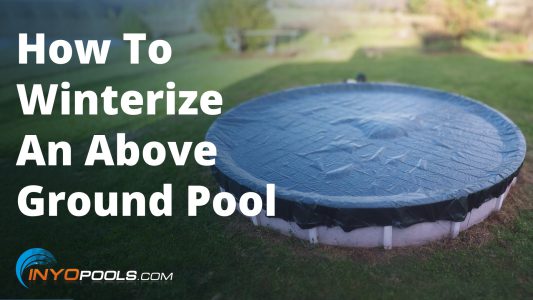You think your pool is leaking? Oh boy. OK, first thing, do not attempt to look for a leak in an above ground swimming pool if you only think it has a leak. Instead, only attempt to find a leak in a pool when you know it has a leak. This simple rule will save you a lot of unnecessary irritation. As I write this blog post, there are many people (maybe thousands) who are looking for something that isn’t there. Trust me, it’s true. You may even be one of them. I’ve heard pool owners say things like, “My pool only leaks in the fall” and “My pool was leaking and then it stopped.” These types of statements usually tell me that it probably doesn’t have a leak and is instead losing water due to evaporation.
So How Do I Make Sure My Pool Is Leaking?
Evaporation is by far the main factor that causes people to think their pool has a leak when it doesn’t, but there are a couple of other reasons. Pay close attention to your swimming activity. If there are many kids active in the pool, they could be responsible for a lot of water loss. A kid can pull up to four gallons of water with him/her when he/she gets out of the pool. So, if a few kids are splashing around a lot and jumping in and out constantly, the water loss can add up. Also, do you maybe have an uncle that likes to help around the place whether you want him to or not? Perhaps he is backwashing your sand filter twice a week or draining some pool water after it rains and you don’t know he’s doing it. Make sure of these things before you say your pool has a leak.

Back to evaporation. Finding out how much water your pool is losing due to evaporation requires two things some people have difficulty with – time and consistency. Give it at least a week and do the following eleven things:
- Fill a bucket with exactly 12 inches of water and place it right next to the pool.
- Make sure the bucket doesn’t leak and that no one messes with the bucket.
- Mark the water level on the bucket.
- With the pool pump off, carefully mark the water level of the pool. It won’t be as easy to do as it sounds and may take practice. Use a nonpermanent marker or good tape.
- For best results, don’t allow any swimming for the week. Don’t backwash either.
- Every 24 hours, mark the bucket’s water level and the pool’s water level next to the other marks that you made prior .
- Repeat this for at least a week and do it accurately.
- If I understand correct, when evaporation occurs the next marks will not be next to the other marks. The use of “next to” might confuse the readers. I suggest you instead write, “Every 24 hours, mark the bucket’s water level and the pool’s water level below the other marks that you have made prior.”
- After a week, measure the distance between the marks that you have measured every 24 hours on the bucket.
- Measure the distance between the marks that you have measured every 24 hours in the pool.
- Compare the recorded distances from the bucket and the pool.
- If the distances from the pool’s marks are greater, you have a leak.
- If the distances from the bucket’s marks are greater, your dog is drinking out of the bucket. Leave the dog in the house for a week and repeat above steps.
If I understand correct, when evaporation occurs the next marks will not be next to the other marks. The use of “next to” might confuse the readers. I suggest you instead write, “Every 24 hours, mark the bucket’s water level and the pool’s water level below the other marks that you have made prior.”
The natural rate of evaporation will vary depending on where you live and what time of year it is. I’ve read that the maximum loss due to evaporation is a third of an inch every 24 hours. This amount is an extreme example that would only occur somewhere in the desert like Phoenix in the late summer. Here in Orlando, the most loss that I have recorded was about a quarter of an inch every 24 hours. Usually it is much less or about an eighth of an inch every 24 hours.
The drier the air, the more water your pool will lose due to evaporation. Sadly, I was a pool guy for years here in Central Florida before I realized that. Our summers are so humid and hot here that I thought the summer was when we had most loss due to evaporation. It wasn’t until I spent a few years marking pools and observing the results that I determined that the fall’s dry air causes the greatest rate of evaporation. So for all you blog skimmers and those bad at math, here’s a bold statement: If your pool is losing more than a third of an inch of water a day, it probably has a leak.

When It Rains, Water Is Added to Your Pool
Call me Captain Obvious all you want, but it’s worth mentioning. In Florida the air gets drier in the fall. It also doesn’t rain nearly as much which is another trigger for pool owners to think they have a leak. Now you may not be surprised at the amount of inquiries I get every fall regarding pools losing water. In the summer when it’s raining at least a few times a week, people get used to their pools having lots of water in them. They may even have to drain them occasionally. Now it’s October and all of a sudden they look out and the pool’s water level is a little low. Some then will think, “Wow, the pool’s water level is low. I must have a leak.” Maybe they do have a leak, but they probably don’t. It just stopped raining as much. Every area has a different rain pattern and dry season so please keep this in mind before you freak.
Certainly it can be stressful to think your swimming pool is leaking. My advice is take a breath and follow the steps to make sure you do in fact have a leak. It may very well not be leaking. Sometimes it’s just normal for the time of year. If you follow the above steps and find that your pool is in fact losing more water than can be attributed to evaporation, then by all means, freak out. Afterwards, find my blog post on how to find a leak in an above ground pool and then you can calm down.
If I understand correct, when evaporation occurs the next marks will not be next to the other marks. The use of “next to” might confuse the readers. I suggest you instead write, “Every 24 hours, mark the bucket’s water level and the pool’s water level below the other marks that you have made prior.”
If you have any questions on your above ground pool then we would be happy to help, feel free to give us a call at 1-877-372-6038 or email us at upload@inyopools.com If you liked this article then make sure to sign up for Blog and get our Free 128 Page Pool Care Guide.












It’s July and I’m just now opening the above ground pool. When I removed the liner I noticed the water was only about half of what was there when I closed it last fall. Is this normal to have lost that much water since I left it covered longer than normal or does it sound like I have a leak? I just installed a new liner last year.
We have found a tear in the liner and 1 hole but we continue to see leakage it seems to stop or slow once we get below the skimmer but we see no water on the filter or the outside of the skimmer when running. Could the leak be on the walls above the skimmer if so is there a way to detect now that the water is below the skimmer?
We have payed a year in the liner and 1 hole but we continue to see leakage it seems to stop or slow once we get below the skimmer but we see no water on the filter or the outside of the skimmer when running. Could the leak be on the walls above the skimmer if so is there a way to detect now that the water is below the skimmer?
Ok new pool owner we just recently installed a 21’x52” AG pool and I think I may have accidentally caused the loss of water myself I backwashed the filter and the turned it to the clean setting. After doing to I forgot to switch it back to filter. Would this cause the water level to drain as much as it did?
I have a 30’ round metal wall above ground. It’s losing 1 inch of water per day and is now about half full. I found a place on the outside of the pool near a pole where the ground is consistently wet and I can see a small amount of water coming out. However, I cannot find a leak in the vinyl liner near this location inside the pool. Any ideas on how to detect the leak?
Other than following the process I explain in this article, I don’t have much to add. If you can’t find the leak, you’ll wind up buying and installing a new liner. It may be worth it for you to re-read the article and try again. I feel like the leak is close but you didn’t look good enough.
I live in RI and I closed my above ground pool about two months ago. It’s obvious that I have a leak, most likely towards the bottom. Should I do anything at this point? Will I have a problem over the winter if most or all of the water leaks out?
Thanks.
Don’t think you’ll have a problem unless the pool is out in the open and you get some gale force winds. Even then you are probably ok.
Hello, we’ve had a 33’×18’×52″ above ground pool installed this summer. My issue is loss of water! The water has had to be replaced once because of a issue with the water level. It appears to stop after it reaches below the skimmer. So I put knew o-rings in the filter, this seems to solve the problem. In which it didn’t! So we’re back to square one!!! Question ” what should I do too fix this issue before the end of the swim season ends?? Any ideas would be appreciated thank you.
“This seems to solve the problem, In which it didn’t.” What do you mean by this? Did it solve the problem(temporarily)or not? I say to find my article here on how to find a leak in an above ground pool and pay closest attention to the checking the equipment and skimmer part.
I have a 24 ft Michigan Pool. It was newly installed last summer. It is an above ground pool set in the ground with a drain (2). We had zero problem last year but after opening this weekend we noticed the pool level was down almost a foot lower. My husband usually drains the pool to 6 inches below the skimmer for the winter. So we were shocked and as the day wore on it got lower. It is only at 6 or 8 inches but does not appear to be leaking. We can’t figure it out and have talked to several pool people and they cant figure it out either but do you have a clue. I told my husband maybe he knocked a valve previously and he insists he didn’t. Why didn’t it totally drain out prior to cover removal. We are stumped.
Hello Diane,
Here is an answer from Dan:
“I couldn’t say but have seen stranger things. I have seen concrete pools only leak during certain times a year and I have always thought it was from the ground’s water table. If you have a leak at the main drain and the water table is high enough, then water will not exit from the leak as the water pressure from the earth(underneath the pool) will not allow it. Then when the earth’s water table drops(like during the dry season), the pool can then leak water out of its hole.
The above may be the case with your pool but it was more than likely from a forgotten human action.
Thanks
Dan”